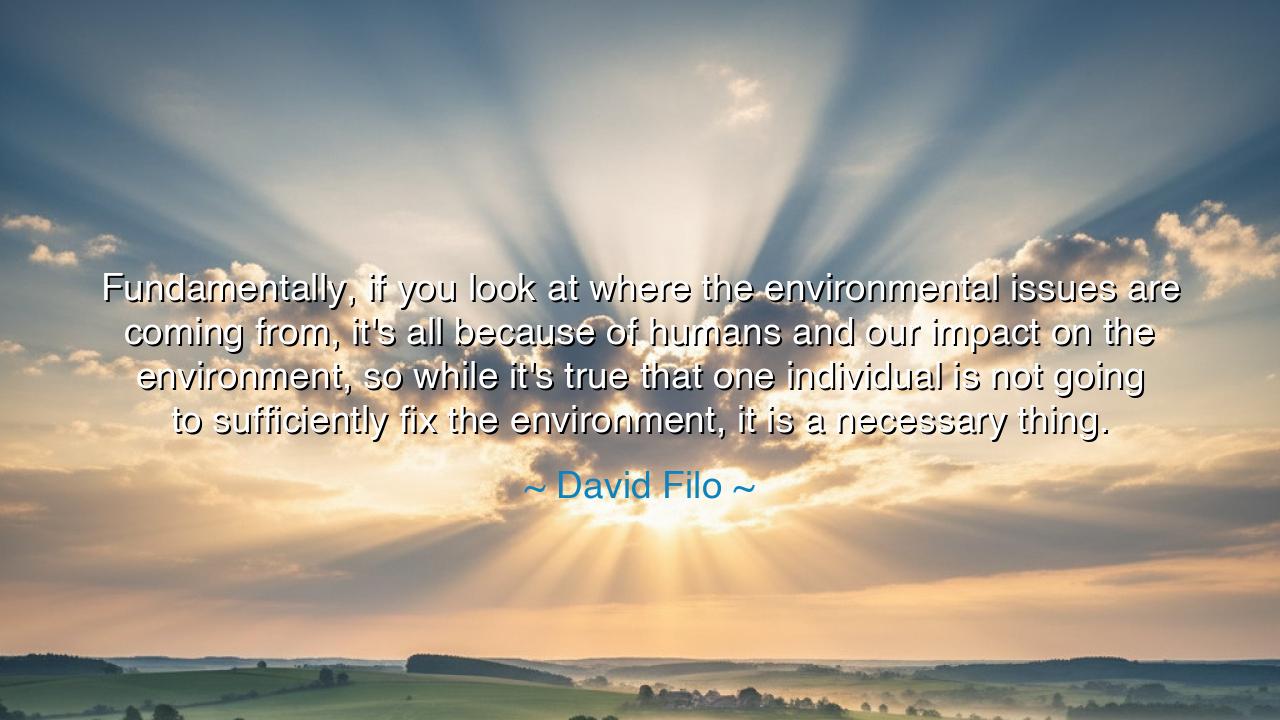
Fundamentally, if you look at where the environmental issues are
Fundamentally, if you look at where the environmental issues are coming from, it's all because of humans and our impact on the environment, so while it's true that one individual is not going to sufficiently fix the environment, it is a necessary thing.






Hear the words of David Filo, who, with the clarity of reason, declared: “Fundamentally, if you look at where the environmental issues are coming from, it’s all because of humans and our impact on the environment, so while it’s true that one individual is not going to sufficiently fix the environment, it is a necessary thing.” These words strike at the very heart of our age, reminding us that though the earth has endured for millennia, it is mankind’s hand that now threatens its balance. And yet, even in the face of vast destruction, the duty of each person remains—small though their acts may seem, they are threads in the greater fabric of renewal.
He begins with the undeniable truth: environmental issues are born from human impact. Forests fall not by accident, but by axe and saw. Rivers choke not by fate, but by waste and poison. The skies warm not by chance, but by the smoke of our own fires. To blame the earth is folly; to blame the seasons is ignorance. It is humankind that has bent the order of nature to breaking, and it is humankind that must labor to restore it.
And yet, Filo acknowledges the daunting truth: no single individual can heal the earth alone. One man cannot stop the rising seas; one woman cannot cleanse the poisoned air. The scale of the wound is too vast for solitary effort. This can tempt the heart into despair, whispering, “Why try at all?” But Filo’s wisdom turns this despair into resolve: though one alone cannot suffice, the contribution of each is still necessary. Without the small, there is no great; without the many, there is no multitude.
Consider the example of the Civilian Conservation Corps during the Great Depression. Each young worker planted trees, cleared trails, restored lands. A single man’s labor was small; he planted but a handful of saplings. Yet taken together, they planted billions, reshaping the American landscape, healing soils, and birthing forests that endure to this day. This is the very spirit of Filo’s teaching: that the acts of individuals, though insufficient alone, accumulate into power capable of transformation.
History also warns of the opposite: of times when men and women excused their inaction by saying, “My effort is too small.” On Easter Island, each tree that fell seemed insignificant. One man’s cutting could not destroy a forest. Yet when every man thought thus, the land was stripped bare, and the society collapsed into ruin. Here we see the shadow of Filo’s wisdom: neglect of the small, multiplied, leads to catastrophe. Action, however small, is likewise multiplied into hope.
The lesson is clear: do not despise the weight of your contribution. Recycle though it seems a drop in the ocean. Conserve though the waste of others surrounds you. Plant trees though you may not live to sit in their shade. Support leaders who guard the earth. Teach children to cherish the land. These acts, when united with countless others, weave together the fabric of restoration.
Therefore, live with humility and resolve. Accept that you alone will not save the world, but also accept that the world cannot be saved without you. This is the paradox and the beauty of responsibility: it calls each of us to labor in faith, trusting that our hands, joined with others, will bring forth renewal.
So let the words of David Filo echo in your spirit: environmental healing is both beyond the power of one, and yet dependent on the action of each. Take up your share of the burden, and let your life be part of the great chorus of stewardship. For though the task is immense, it is not impossible—if all rise together.






AAdministratorAdministrator
Welcome, honored guests. Please leave a comment, we will respond soon